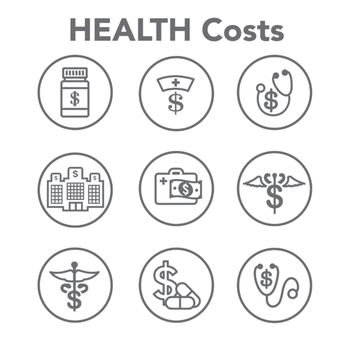
Employers
Latest News

A. Mark Fendrick, MD, director of the Center for Value-Based Insurance Design (V-BID) at the University of Michigan and co-editor-in-chief of The American Journal of Managed Care®, and Suzanne F. Delbanco, PhD, executive director of Catalyst for Payment Reform, discuss V-BID X for employers, a plan constructed through benefit-design and payment reform that works to promote high-value services and deter low-value care.
Latest Videos
More News

Dr Bruce Sherman: Adding Nuance Can Make Value-Based Insurance Design More Impactful for Employers
Making benefit design more nuanced through the inclusion of employee variables could help increase the impact of value-based insurance design for employers, said Bruce Sherman, MD, chief medical officer of the National Alliance of Healthcare Purchaser Coalitions.

On this episode of the podcast, we speak with Peter Bonis, MD, chief medical officer, Clinical Effectiveness, Wolters Kluwer Health, which recently released the survey, Mending HealthCare in America 2020: Consumers & Cost.

An array of different techniques, including direct primary care, are being used by employers to manage healthcare costs while keeping care affordable for employees, according to Bruce Sherman, MD, chief medical officer of the National Alliance of Healthcare Purchaser Coalitions.

In MassMutual’s 2019 Workplace Financial Wellness Study, survey data gathered by Greenwald & Associates reported that a large majority of employers believe their employees are struggling financially in saving for retirement, settling debt, and dealing with medical costs.

Employers’ decisions around purchasing healthcare plans should focus on a broader measure of value, including employee productivity, not just cost, according to Bruce Sherman, MD, chief medical officer of the National Alliance of Healthcare Purchaser Coalitions.

Bret Jackson Discusses Upcoming Challenges of Paying for Specialty Drugs, Therapeutic Advancements
A major upcoming challenge in healthcare will be determining how to pay for specialty drugs and medical advancements like cellular therapies, said Bret Jackson, president of the Economic Alliance for Michigan.

In a news brief published by AHIP, initiatives employed by health insurance providers AmeriHealth Caritas, Geisinger, Horizon Blue Cross Blue Shield of New Jersey, and UPMC plan to address issues ranging from the opioid crisis to behavioral healthcare access.


The FDA approved [fam-] trastuzumab deruxtecan-nxki, which will be marketed as Enhertu; preliminary CMS numbers show that 8.3 million people enrolled in coverage under the Affordable Care Act (ACA) from November 1 to December 17, about 2% fewer than last year; Sutter Health agreed to pay $575 million to settle claims of anticompetitive behavior brought by the California state attorney general as well as unions and employers.

Progress toward value-based payment models is moving slowly, so employers and healthcare systems need to recognize the value of taking on risk and encourage surrounding entities in their communities to do the same, said Bruce Sherman, MD, chief medical officer of the National Alliance of Healthcare Purchaser Coalitions.

The National Business Group on Health released its list of healthcare trends to watch in 2020, highlighted by growing employer initiatives on high quality, high value healthcare, and an increased focus on mental health issues.

In PwC Health Research Institute’s report, “Top health industry issues of 2020: Will digital start to show an ROI?” researchers highlighted the forces that will most powerfully affect the health industry in 2020, with a chief focus on the concern emerging from revisions to overseas tax provisions.

The unique market dynamics in Michigan have contributed to lower hospital prices, but it remains to be seen if recent policy changes will reveal these prices to be artificially depressed, according to Bret Jackson, president of the Economic Alliance for Michigan.

Partnerships are essential for overcoming the barriers to implementing value-based care, explained Vanessa Sammy, MPA, MHSA, senior director of commercial strategy and implementation for Remedy Partners.

Prominence Health Plan announced that its 7 Universal Health Services (UHS) Accountable Care Organizations (ACOs) revealed a continued trend of increased cost savings and improved quality in 2018 results.

Here are the top 5 articles for the month of November.

Over the next 5 years, mental health conditions are expected to become 1 of the most significant factors attributed to employer-sponsored healthcare benefit costs worldwide, according to survey findings.

A RAND study comparing hospital prices across states provided insights into the drivers of high healthcare spending in Michigan, explained Bret Jackson, president of the Economic Alliance for Michigan.

For both in-network access and provider reimbursement rates, disparities between physical and behavioral healthcare is worsening for American families seeking affordable and available mental healthcare and addiction treatment, according to study findings.

New tools enabling data access can help patients choose the most appropriate site of care for their needs, representing a significant change in the care delivery paradigm, according to Vanessa Sammy, MPA, MHSA, senior director of commercial strategy and implementation for Remedy Partners.

Mercer’s 2019 National Survey of Employer-Sponsored Health Plans highlighted 3 key areas of focus for employers in 2019, which were balancing affordability and choice, empowering employees to improve their health through tech-enabled solutions, and addressing high-cost claims.

This week, the top managed care news included Medicaid tightening the reins on supplemental payments; employers needing more data to control benefit costs; experts saying prior authorization mostly burdens patients.

Identification of chronic diseases in their early stages enables prompt treatment that can slow or prevent disease development and debilitating and costly health outcomes.

First Stop Health’s inaugural 2019 Health Benefits Cost Containment Report found that reining in benefits spending is a top priority for employers, but many lack the data necessary to make effective changes, according to results of a survey of human resources professionals.

An analysis of a carrier-based mandatory obstructive sleep apnea (OSA) program on truckers’ non–OSA-program medical insurance claim costs revealed substantial healthcare cost savings, according to study findings.












